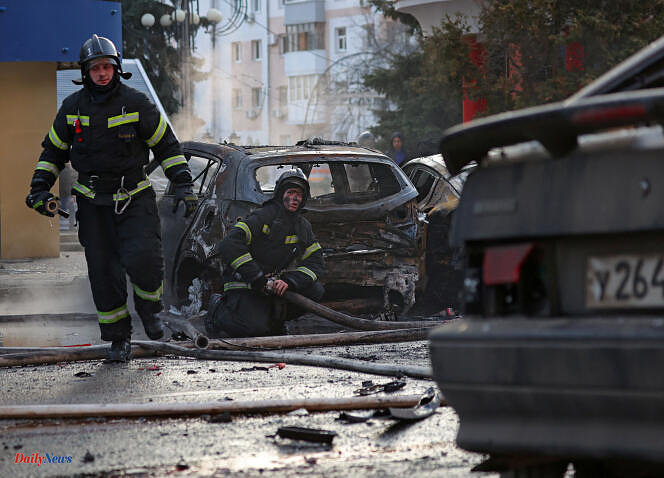While the front line has remained frozen for several months in the conflict between Ukraine and Russia, the bombings have experienced a deadly escalation, with the two camps seeming to respond to each other.
On Saturday, December 30, Moscow blamed a strike on the Ukrainian army which, according to local authorities, killed 21 people, including three children, and left around 110 injured in the Russian town of Belgorod, located 30 km from the border with Ukraine and about 80 km north of Kharkiv. Images posted online showed cars on fire, buildings with broken windows, and columns of black smoke rising on the horizon. “We have witnessed the worst consequences of the Ukrainian army’s bombings in two years,” condemned the region’s governor, Vyacheslav Gladkov.
Russian forces managed to intercept two missiles and “most” of the rockets launched against the city, the Russian Defense Ministry said, avoiding “infinitely more serious” consequences. However, several rockets and missile debris fell on the city, he said.
Ukraine regularly carries out strikes in Russia, particularly in the regions closest to its territory, but their toll is generally much lower. Although kyiv has not yet reacted to these accusations, the Russian Defense Ministry has already assured that the attack will not go “unpunished”.
Seventeen dead in Russian strike on kyiv
At an emergency meeting of the United Nations (UN) Security Council in New York, Moscow on Saturday accused Ukraine of committing "a deliberate act of terrorism" and using weapons to strike Belgorod cluster munitions. It is “a blind and deliberate attack against a civilian target,” said Russian Ambassador to the UN, Vassily Nebenzia, accusing kyiv of having targeted a sports center, an ice rink and a university. “Security Council members have the opportunity to do their duty and objectively assess what happened,” he added.
For its part, Ukraine was still counting its dead on Saturday, after intense strikes the day before on several cities, including the capital, kyiv. Around forty people were killed, Ukrainian President Volodymyr Zelensky announced, adding that around a hundred others had been injured.
This wave of attacks, one of the most violent since the start of the war almost two years ago, targeted buildings, a maternity ward and even a shopping center, but also industrial and military infrastructures. In kyiv, seventeen people were killed according to the local administration of a city where deadly strikes had become rarer in recent months. Friday's strikes prompted strong international condemnations, with the UN secretary-general speaking out against "appalling attacks".
Ukraine attacked again on Saturday
New strikes targeted Ukrainian territory on Saturday, killing three people in the regions of Kherson, Zaporizhia and Chernihiv, according to various local authorities. In the northeastern city of Kharkiv, 26 people were injured, according to the latest report from local authorities. The attorney general said two teenagers and a Briton, who was security adviser to a team of German journalists, were among the injured. A hotel, a nursery school, buildings and restaurants were affected, according to the same source.
The city's mayor, Ihor Terekhov, reported new Russian attacks during the night from Saturday to Sunday. “As a result of the nighttime Russian drone attack on Kharkiv, buildings in the city center were damaged. These are not military installations but cafes, residential buildings and offices,” Mr. Terekhov wrote on Telegram, without mentioning any casualties. “On New Year’s Eve, the Russians want to intimidate our city, but we are not afraid,” he added.
On Saturday, Volodymyr Zelensky launched a new appeal to his allies, assuring that arming Ukraine is “a way to protect lives”. “Every manifestation of Russian terror proves that we cannot wait to provide assistance to those who are fighting,” he argued.
Russian President Vladimir Putin and his Ukrainian counterpart are both due to deliver expected New Year's speeches on Sunday, following a 2023 marked by a disappointing Kiev counter-offensive and a near-total freeze of the front line.












